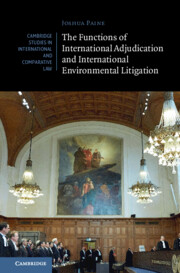
-
Select format
-
- Publisher:
- Cambridge University Press
- Publication date:
- May 2024
- May 2024
- ISBN:
- 9781108655651
- 9781108493499
- Dimensions:
- (228 x 152 mm)
- Weight & Pages:
- 0.69kg, 370 Pages
- Dimensions:
- Weight & Pages:
You may already have access via personal or institutional login
Book description
This book uses environmental disputes as a focus to develop a novel comparative analysis of the functions of international adjudication. Paine focuses on three challenges confronting international tribunals: managing change in applicable legal norms or relevant facts, determining the appropriate standard and method of review when scrutinising State conduct for compliance with international obligations, and contributing to wider processes of dispute settlement. The book compares how tribunals manage these challenges across four key sites of international adjudication: adjudication in the World Trade Organization and under the United Nations Convention on the Law of the Sea, International Court of Justice litigation, and investment treaty arbitration. It shows that while international tribunals perform several key functions in the contemporary international legal order, they are subject to significant constraints. Paine makes a genuine addition to literature on the role of international adjudication in international law which will benefit academics, practitioners, and policymakers.
Awards
2nd prize, 2024 Margaret Brazier Prize for Outstanding Mid-Career Legal Scholarship, The Society of Legal Scholars
Honorable Mention, 2025 Book Prize, Australian and New Zealand Society of International Law
Reviews
‘This book is a must-read for anybody seeking a better understanding of the problems faced by modern-day international law adjudication, and exploring solutions to them. Joshua Paine develops a powerful argument that comparative approaches that scrutinize the law and practice of various international courts and tribunals hold the key to such endeavors and can make a real difference, for states, but also the courts and tribunals themselves.’
Stephan Schill - Professor of International and Economic Law and Governance, University of Amsterdam
‘International environmental litigation has emerged as an emotive topic of contestation. Deftly addressing the intricate legal details of these judicial and arbitral processes with rigour and clarity, Dr Paine’s monograph serves to temper the debate. An excellent book.’
Gleider Hernández - Professor of Public International Law, Catholic University of Leuven (KU Leuven), and President of the European Society of International Law
‘Paine has presented a richly-researched and insightful examination of the functions of international courts and tribunals. His book is a significant contribution to the literature and essential reading for those studying and working in international dispute settlement, international trade law, investment treaty law, the law of the sea and international environmental law.’
Natalie Klein - UNSW Sydney
‘Joshua Paine’s book is timely and most welcome when environmental disputes are at the forefront of the adjudicatory agenda. The book helps us understand and navigate through the various functions that ICJ, ITLOS and arbitral tribunals, WTO Dispute Settlement Mechanism and investment arbitral tribunals can play, as well as the legal techniques they can resort to, while underlining the particularities of each one’s contribution. Last but not least, Paine stresses how some of these judicial institutions aim at furthering cooperation between the parties in a post-adjudicatory phase. Paine’s book is a must read on a topic which will undoubtedly grow in importance.’
Laurence Boisson de Chazournes - Professor of International Law at the University of Geneva
‘This fine book rewards with important insights into international law’s capacity to adapt to complexity and change. With deftness in traversing international trade and investment regimes, the law of the sea, and general international law, Dr Joshua Paine helpfully compares and evaluates contemporary judicial functions and practices.’
Margaret Young - University of Melbourne
‘This timely study exploring the adjudication of environmental disputes across a range of influential international courts and tribunals offers an invaluable guide for both scholars and litigators. Joshua Paine’s detailed comparative analysis provides a much-needed mapping of the ways in which institutional contexts shape the conduct and outcomes of international environmental litigation.’
Anne Orford - University of Melbourne
‘In this broad-ranging work, Joshua Paine unpacks the case law and practice of four adjudicatory settings to identify the key factors influencing dispute settlement concerning environmental matters. The insightful analysis addresses the core challenges facing international courts and tribunals as they seek to meet the needs of the international community in an era of mounting environmental problems, whilst simultaneously striving to maintain their legitimacy as judicial actors.’
James Harrison - Professor of Environmental Law, University of Edinburgh
‘This important work offers a deeply insightful contribution to understanding how international adjudicative bodies have balanced the competing imperatives of stability and change in addressing both perennial and novel challenges facing the international legal order.’
Tim Stephens - Professor of International Law, University of Sydney
‘A timely, professional and informative book that describes the core functions and implications of international adjudications and litigation, and reveals some shortcomings of existing international adjudication systems … The book sheds fresh light on how to better promote the continuous updating and enhancement of international environmental law, thereby enabling it to more effectively address challenges and resolve disputes. Although concentrating on international adjudications in environmental disputes, this book has strong reference significance for various issues in international adjudication within international law. The book is an excellent academic and practical reference work in the field of international law and environmental law.’
Source: International Environmental Agreements: Politics, Law and Economics
Contents
Metrics
Full text views
Full text views help Loading metrics...
Loading metrics...
* Views captured on Cambridge Core between #date#. This data will be updated every 24 hours.
Usage data cannot currently be displayed.
Accessibility standard: Unknown
Why this information is here
This section outlines the accessibility features of this content - including support for screen readers, full keyboard navigation and high-contrast display options. This may not be relevant for you.
Accessibility Information
Accessibility compliance for the PDF of this book is currently unknown and may be updated in the future.


